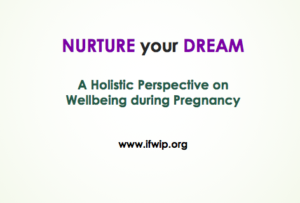The importance of wellbeing during pregnancy has been acknowledged throughout the entire human history. Stress is an important factor impairing the wellbeing during the transition to parenthood. The scientific literature has shown the adverse impacts of stress during pregnancy and the perinatal period. This article briefly describes a comprehensive approach to self-care (NURTURE) and professional care during pregnancy (DREAM) to ensure wellbeing during pregnancy and beyond.
What is Wellbeing?
There is no universally agreed single definition of wellbeing. It is generally agreed that wellbeing includes, at the minimum, the following three factors:
1) Frequent positive emotions, mood, and feelings
2) Satisfaction with life, fulfillment and positive functioning
3) Infrequent negative emotions
This is also known as ‘Subjective Wellbeing’ as described by Diener (1984). This usually indicates happiness in life and a positive and holistic outlook towards health. (Ref 1)
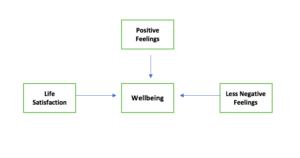
What can impair the wellbeing during pregnancy?
There are two primary causes of psychological distress and impairment of wellbeing (i.e., more 'negative emotions') during pregnancy and perinatal period:
1) Stress
2. Perinatal Mental health illnesses, such as anxiety, depression, and other mental health conditions.
What factors can aggravate stress/ mental health during pregnancy?
A lot of psychological changes take place during pregnancy along with the physical adaptations due to the growing fetus.
There are some general stress factors which can occur at any time of our life, such as bereavement, financial difficulties, conflict, and ill health of family members.
However, some specific factors arise during pregnancy (and post-childbirth period) as follows:
1. Stress related to the Transition to Parenthood.
2. Pregnancy-related anxiety/ pregnancy-specific stress and Tocophobia.
3. Pregnancy ailments (such as Hyperemesis Gravidarum, Insomnia, and Pelvic Girdle Pain) and complications (such as gestational diabetes)
4. Diagnosis of birth defects (such as Congenital Heart Disease and Neural Tube Defect)
5. Work-related stress.
Why is the wellbeing during pregnancy so important?
Good emotional health and wellbeing during pregnancy (and postpartum period) for the pregnant woman, partner, and the child.
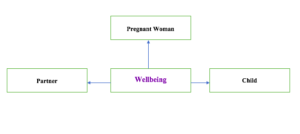
This is due to the following reasons:
1) Achieving optimum health of the mother:
The World Health Organization (WHO) defined health in its 1948 constitution as “a state of complete physical, mental, and social wellbeing and not merely the absence of disease or infirmity.”
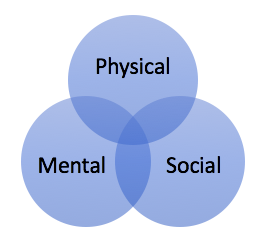
WELLBEING: DEFINITION OF HEALTH (WHO)
Emotional wellbeing is not only an essential part of health but also to establish a strong foundation for a happy, fulfilling, and better quality of life.
Different Complementary and Alternative Medicine techniques (such as Reflexology, Emotional Freedom Techniques, Ayurveda), Mind-Body interventions (such as Yoga and Meditation), and Energy Healing methods (such as Reiki) have been studied to explore their effectiveness as a stress management strategy during pregnancy and beyond.
2) Achieving a healthy pregnancy:
There is scientific evidence to suggest that antenatal stress can lead to pregnancy complications such as:
- Preeclampsia
- Premature birth
- Growth Restriction of the developing fetus in the mother's womb.
Therefore, achieving the optimum mental wellbeing could potentially reduce such untoward complications.
3) Achieving optimum family health:
We now know that how the events of pregnancy could have an impact on the:
- Mental health of the partner
4) Achieving the optimum health of the child:
Stress/ mental illnesses can lead to many physical (such as asthma), emotional, cognitive, and behavioural problems of the child.
Although the exact mechanism is not known, studies indicate the role of Fetal Programming and Secure Attachment.
Therefore emotional wellbeing is important for the health and well-being of the future generation of the human society.
5) Achieving good health for the future:
Pregnancy is a great opportunity to reflect and consider healthy lifestyle changes which would be beneficial for the rest of the life.
Asking mothers about their stress and mental health could disclose conditions which have never been addressed. This could empower them with good stress management strategies.
6) Achieving optimum antenatal and postnatal mental health:
Inability to cope with the stress of transition to parenthood could lead to an increased chance of anxiety, depression, and other mental health conditions both during the pregnancy and postnatal period.
About one-third cases of Postnatal Depression (PND), it is the continuation of depression during pregnancy.
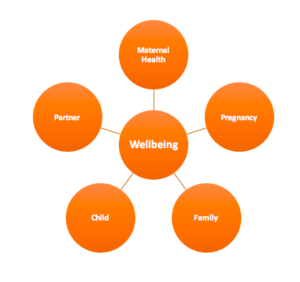
Why is the treatment of Perinatal Mental Health (PMH) conditions so important?
Suicide (as a result of untreated serious mental health illnesses) is still one of the biggest killers of new mothers all over the world.
According to the WHO, for every death of the mother, there are 150 'near misses', therefore the death statistics are just 'the tip of the iceberg'. Optimum information and interventions could certainly prevent the loss of many valuable lives.
It is estimated that 10-15% mothers suffer from Perinatal Mental Health (PMH) conditions.
It is now considered that depression and anxiety are equally prevalent during pregnancy period as of post-childbirth time. PMH is one of the most common health conditions during pregnancy.
'Just as the body changes in pregnancy, so can the mind'
The cost of untreated Perinatal Mental health illnesses could be huge. For example, a report published by London School of Economics (LSE) showed that UK National Health Service (NHS) spent £8.1 billion every year to deal with the consequences of Perinatal Mental Health (PNH) illnesses.
Almost three-quarters of this are, in fact, spent for the care and treatment of the consequences of the maternal mental health conditions to the children.
Whereas, only £375 million per year is needed to be invested to provide care for PMH conditions according to the national standard. This saving could be invested somewhere else for the betterment of the society.
This is statistics from the UK and could reflect the gravity of the cost in many other countries of the world.
What are the protective factors for wellbeing during pregnancy?
1) Family and social support network
3) Resilience
What is Resilience?
Resilience refers to the person’s the ability to adapt successfully to adverse life events so that the normal physical and psychological functions are maintained. (Ref)
Several neurological networks, neurohormones, neurotransmitters, and neuropeptides are involved in the development of a person’s resilience trait. This is influenced by genetic, epigenetic, psychological, social and developmental factors. (Ref)
Is it possible to enhance the Resilience?
The ability to deal with stress and better emotional balance can certainly be improved by adopting certain healthy lifestyle measures (Ref)
Pregnancy is a wonderful time to reflect on the healthy habits both for the pregnant woman and her partner.
Dr. Raja Gangopadhyay, a Consultant Obstetrician and the Founder of the International Forum of Wellbeing In Pregnancy (IFWIP), advocates the following four self-care measures to improve wellbeing during pregnancy (and beyond):
- Diet: To highlight the importance of good Nutrition (NU) during pregnancy and beyond
- Rest: To take adequate Rest (R), unwinding, and sleep.
- Exercise: To encourage pregnant women to Take Up (TU) safe regular physical exercise during pregnancy
- Relaxation: To explore different deep Relaxation (RE) techniques as an effective stress management strategy.
Dr. Gangopadhyay summarises the above with the mnemonic: NURTURE
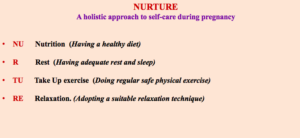
How could a holistic care for emotional wellbeing be provided in every pregnancy?
We know that the emotional health and wellbeing are vital during every pregnancy regardless of prior or existing health conditions.
Dr. Raja Gangopadhyay advocates a comprehensive approach to care during pregnancy (by the healthcare professionals) and the postpartum period with the mnemonic: DREAM
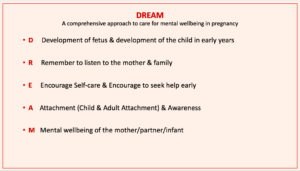
At the IFWIP, we aim to raise awareness of wellbeing during pregnancy and discuss different strategies to combat stress during this vital period of life through primarily the NURTURE (for the parents) and DREAM (for the healthcare professionals) approach.
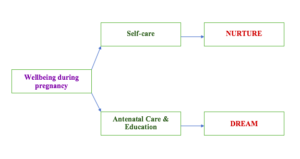
We believe this could ensure not only a happy and healthy pregnancy but also lay a strong foundation for a good health, relationship, and parenting abilities.
Wellbeing during pregnancy is also important for the physical, emotional, behavioural, and cognitive development of the child. This would ensure a better and healthier future for the child.
Reference
Diener, E. (1984). Subjective well-being. Psychological Bulletin, 95, 542–575.
Disclaimer:
NURTURE and DREAM are just the mnemonics to summarise some important aspects of a healthy lifestyle, self-care, and highlights some best practice of pregnancy/ perinatal care. They are not clinical guidance or mental health treatment advice and should not replace any clinical guidance and medical care. It is strongly recommended that lifestyle measures mentioned in the website should be adopted/ continued during pregnancy after consultation with an expert, trainer, and medical practitioner during pregnancy and postpartum period. Please read our detailed Disclaimer policy here.


